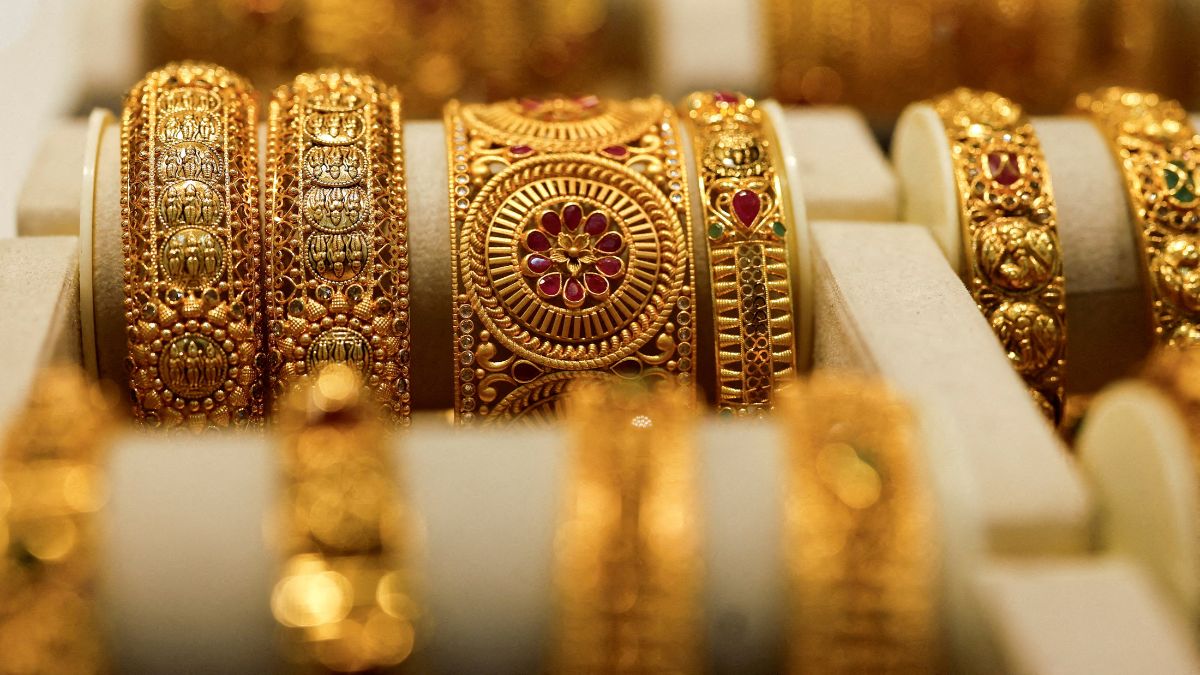Surge in gold prices is opening up new avenues for recycling
 Gold bangles displayed at a jewellery store in Mumbai, India on March 20, 2025. (File) | REUTERS
Gold bangles displayed at a jewellery store in Mumbai, India on March 20, 2025. (File) | REUTERS
Indians' love for gold is no secret. In 2024 alone, gold demand in the country was around 803 tonnes, up from 761 tonnes in 2023. It is estimated that Indian households and temples together hold close to 30,000 tonnes of gold. However, India still imports a large portion of its annual gold requirements. Last year, for instance, close to 712 tonnes of gold was imported.
Muthoot Exim, a part of the Kerala-based gold loan major Muthoot Pappachan Group, wants more Indians to recycle gold, a move that could also help India save precious foreign exchange.
Typically, for Indians, gold jewellery has not just been an accessory, but also a store of value, which comes in handy during financial emergencies. Many Indians also exchange their old jewellery or coins and bars to buy new jewellery, more so when prices are high. The process is fairly easy if you went back to the same jeweller from where the jewellery was purchased. But, that may not be the case if you went to another jeweller, especially in the case of old jewellery, which wouldn’t be hallmarked as it is mandated today.
Muthoot Exim is trying to change this with its Gold Point outlets. “We found a gap in the market from a consumer angle, there was no transparent method or platform to just sell gold, there was also no scientific way of valuing that gold. That became one of the main reasons for us to get into this business,” said Keyur Shah, the CEO of Muthoot Exim.
The other reason to enter this business was from an economic viewpoint; any amount of gold the company would buy and recycle, that much imports would reduce.
Muthoot Exim started the first Gold Point outlet as a pilot in Coimbatore, Tamil Nadu back in 2015. Today, the company has 54 such outlets in different parts of the country. At Gold Point outlets, the company buys gold from customers, it is scientifically tested and money is instantly transferred to the customer’s bank account. This gold is then sold to refineries, where it is refined and the pure bars are sold back to jewellery manufacturers.
Since opening the first store in Coimbatore, the company has purchased around 4 tonnes of gold. Muthoot Exim has been particularly aggressive in scaling up the business in the last couple of years, encouraged by the post-COVID trends, where many people resorted to selling or pledging gold to sustain themselves. The surge in gold prices in the last two years, too, has helped.
“We are just riding on the existing habits of Indian consumers. Our attempt is to make it more transparent. In every branch, we have a refinery-quality XRF machine. In about 30 seconds, without scratching or rubbing the gold, you can come to know the exact purity of gold and up to 20 other elements that are there,” explained Shah.
The company charges 3 per cent as its fees.
Over the last two years, gold prices have surged amid geopolitical tensions, and sustained buying by global central banks. Prices in the domestic market crossed ₹1 lakh per 10 gram earlier this year, although prices have since corrected a bit. On the MCX, prices for August 05 delivery were at around ₹97,211 per 10 gram.
The high price of gold will continue to drive demand for gold recycling, especially among price conscious consumers, and this will provide more expansion opportunities for companies like Muthoot Exim.
The intension is to touch 100 branches by the end of the current financial year ending March 31, 2026, he said. According to Shah, typically a new outlet breaks even in around 9-10 months.
In the wake of the rising gold prices, gold recycling has seen an uptrend across the world. Last year, recycled gold supply rose 11 per cent to 1,370 tonnes.
Domestically too, it is only expected to go up in the coming years, and that will attract more players like Muthoot Exim.
“Local-level competition has started. This will go up. Conservatively, 300 tonnes you can easily recycle and that will help reduce the import. So, there is so much scope for people to get into it,” said Shah.
Jewellery exchange for new purchases too has risen as high prices have hurt budgets.
“Because the prices were on an upward trend, people were feeling the pinch of having a little lower budget, we have seen that the old gold exchanges went up to close to 39-40 per cent. So that has been a substantial jump. If I recall, maybe 2-3 years back, the old gold exchange was only 25 per cent of the overall sales,” Suvankar Sen, the MD and CEO of Senco Gold said post their full year earnings.
Business